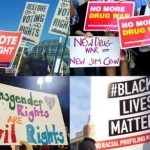WASHINGTON (CNN) — It could be the social issue that defines President Barack Obama’s second term legacy: same-sex marriage.
He faces a monumental choice on Thursday over whether to put the force of his office behind the idea that gays and lesbians have a constitutional right to marry.
Government sources say the Justice Department will by day’s end articulate a legal position in the so-called Proposition 8 case, a ban by California voters over same-sex marriage that is now being challenged in the Supreme Court.
That case and another appeal over the federal Defense of Marriage Act will produce blockbuster rulings from the justices in coming months.
Gay rights groups have privately urged Obama and his top aides to go beyond his previous personal rhetoric in support of the right and come down “on the side of history” in this legal fight.
Those sources tell CNN that Obama has made the final decision over whether to file a brief and what to say.
As of earlier this week, there was still internal debate among White House and Justice Department staff about whether the president should take the big step and say there is a constitutional right of gay and lesbian couples to wed.
The administration was also considering a compromise position — affirming previous support for same-sex marriage, while conceding states may have the option to ban it.
The issue could be a defining moment in Obama’s presidency, similar to the political impact last year when the Supreme Court upheld the health care reform law he spearheaded.
He must decide how much political capital to expend in coming months when expressing his views and those of the executive branch.
Obama has already faced strong opposition on the issue from many Republican state and congressional lawmakers, as well as social conservatives.
The justices will hear oral arguments in the Proposition 8 case March 26, with a ruling due by the last week of June.
The separate case over the Defense of Marriage Act involves a 1996 law that says for federal purposes, marriage is defined as only between one man and one woman. That means federal tax, Social Security, pension, and bankruptcy benefits, and family medical leave protections– do not apply to gay and lesbian couples.
That case will be argued March 27.
But it is the Proposition 8 case where the high court is being asked to establish the constitutional “equal protection” right.
Though technically not a party in the California appeal and not required to weigh in, government sources say the administration would file an amicus or “friend of the court” brief.
The key question for Obama is whether he has decided to stop short of a vigorous endorsement of the constitutional right.
“I have to make sure that I’m not interjecting myself too much in this process, particularly when we’re not a party to the case,” he said last week in an interview with CNN affiliate KGO-TV in San Francisco.
It is rare for a president to be personally involved in the legal and political considerations in a high court appeal, and sources say he has spent a good deal of time reading up on the issue and articulating his views privately.
Much of the legal reasoning in any government brief would reflect in large part his personal thinking, gained from his years as a former constitutional law professor.
There are about approximately 120,000 legally married same-sex couples in the United States.
Dozens of advocacy groups on both sides of the issue have bombarded the high court with briefs, including a coalition of national Republicans, business, faith, and military leaders supporting same-sex marriage.
Among the prominent conservative names lending their view: former Utah governor and presidential candidate Jon Huntsman, Hewlitt-Packard chief executive and former California gubernatorial candidate Meg Whitman, U.S. Rep. Ileana Ros-Lehtinen (R-Florida), and actor Clint Eastwood.
“As a Republican, I believe in protecting individual freedoms and that everyone, including gay and lesbian Americans, has a constitutional right to be treated equally under the law,” said former Rep. Jim Kolbe.
The president has had an evolving position on gay rights, once supporting only civil unions. But in his inaugural address last month, he raised expectations, and perhaps signaled his impending legal views, when offering sweeping rhetoric.
“Our journey is not complete until our gay brothers and sisters are treated like anyone else under the law– for if we are truly created equal, then surely the love we commit to one another must be equal as well.”
Last November, voters in three states– Maryland, Washington, and Maine– approved same-sex marriage, adding to the six states and the District of Columbia that already have done so.
As more states legalize same-sex marriage, one of the key questions the justices may be forced to address is whether a national consensus now exists supporting the idea of expanding an “equal protection” right of marriage to homosexuals
Many other states, including New Jersey, Illinois, Delaware, Rhode Island and Hawaii, have legalized domestic partnerships and civil unions — a step designed in most cases to provide the same rights of marriage under state law.
But other states have passed laws or state constitutional amendments banning such marriages. California’s 2008 Proposition 8 referendum revoked the right after lawmakers and the state courts previously allowed it.
In February, a federal appeals court in San Francisco ruled the measure unconstitutional. In its split decision, the panel found that Proposition 8 “works a meaningful harm to gays and lesbians” by denying their right to civil marriage.
The justices here have discretion to rule narrowly or broadly on the aspects of the legal and procedural questions raised.















